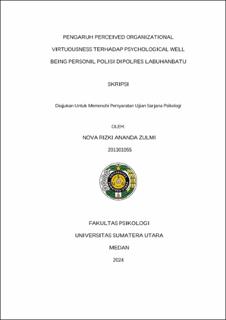Pengaruh Perceived Organizational Virtuousness terhadap Psychological Well Being Personil Polisi di Polres Labuhanbatu
The Effect of Perceived Organizational Virtuousness on the Psychological Well-Being of Police Personnel at Polres Labuhanbatu

Date
2024Author
Zulmi, Nova Rizki Ananda
Advisor(s)
P, Vivi Gusrini Rahmadani
Metadata
Show full item recordAbstract
This study aims to determine the effect of Perceived Organizational Virtuousness on the Psychological Well-Being of police personnel at Polres Labuhanbatu. Perceived Organizational Virtuousness refers to the extent to which police officers perceive the virtues practiced by the organization, such as optimism, forgiveness, trust, compassion, and integrity. Psychological Well-Being is defined as the psychological state of well-being, including self-acceptance, positive relations with others, autonomy, environmental mastery, life purpose, and personal growth. This study used a quantitative method with a correlational design involving 233 police personnel at Polres Labuhanbatu, selected using purposive sampling. The instruments used were the Perceived Organizational Virtuousness scale developed by Cameron et al. (2004) and the Psychological Well-Being scale by Ryff (2013).
The results showed that most police personnel perceived organizational virtuousness at a moderate level (85.84%) and their Psychological Well-Being was also at a moderate level (97.85%). Additionally, the results of a simple linear regression test indicated that Perceived Organizational Virtuousness had a positive and significant effect on Psychological Well-Being, with a determination coefficient (R²) of 10.3%. This means that Perceived Organizational Virtuousness explains 10.3% of the variability in Psychological Well-Being. The practical implication of this study is the importance for Polres Labuhanbatu to continuously promote and reinforce perceived organizational virtuousness to improve the psychological well-being of its personnel.
Collections
- Undergraduate Theses [1428]
